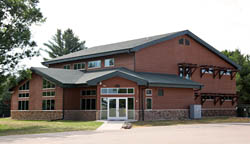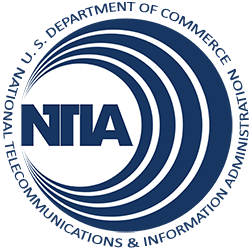The Public Computer Center at the College of Menominee Nation, Wisconsin
 While Native American Heritage Month is celebrated just once a year in November, the National Telecommunications and Information Administration (NTIA) has been serving America’s Tribal Nations effectively for many years through its grant programs.
While Native American Heritage Month is celebrated just once a year in November, the National Telecommunications and Information Administration (NTIA) has been serving America’s Tribal Nations effectively for many years through its grant programs.
One such grant of $3.4 million was made in 2010 to the College of Menominee Nation (the College) through the Broadband Technology Opportunities Program (BTOP). This Public Computer Center (PCC) project included the construction of a new 10,000 square foot campus Technology Center and upgrades of broadband capacity to serve the more than 5,000 members of the Menominee Tribe, who live in one of Wisconsin’s more rural and economically disadvantaged areas. According to Ron Jurgens, Institutional Research Director for the college, the new facility continues to draw people from the reservation and neighboring counties to use the technology, pursue their educational goals, and take advantage of 100 megabit Internet service. In fact, the center is so popular that the county board voted to relocate the public library on the college campus.
The project included certificate and technical diploma training, skills-building activities ranging from GED assistance to math and reading coaching, career exploration and placement, and special workshops for economically vulnerable populations including people with disabilities, at-risk youth, and the unemployed. In an unusual development, the local Workforce Board recently decided to house the area’s Job Center at the Community Technology Center, where two full-time employment specialists now work to help people with job search, resume building, and skill development.
The College also partnered with the University of Wisconsin-Extension, another BTOP grantee, to offer tribal members classes in computer skills and digital literacy. Today, the partnership continues, with an Extension staff member working daily at the CTC.
Many members of the Menominee Nation are active duty military deployed around the world. Learning computer skills, including how to use Skype software, has enabled family members to keep in touch with loved ones serving around the country and overseas. Additionally, PCC staff worked with the local transit authority to place signage promoting the computer center on buses and negotiated a new bus stop in front of the center and library to make it easier for community members to get there.
As of 2013, when the grant was completed, the College reported serving over 2,800 people and providing more than 25,000 hours of training. The project has greatly enhanced the economic recovery of the area by providing certificate and diploma-based training in office technology, electrical trades, welding, and sustainable residential building. These programs provided a ready source of trained employees for local businesses. The skills lab provides general educational development (GED), math, and reading assistance to unemployed individuals to make them more employable. With the 100 megabit Internet connection, students can take on-line courses through any school they wish.
During the three-year project, the College learned many valuable lessons. First, visiting and networking with similar organizations helped in developing computer center services and designing the physical environment. Second, purchasing and providing training on the latest mobile technology, such as tablets and smart phones, helped in attracting members of the community. Third, asking patrons what services and programming they needed and wanted ensured that the project remained relevant. Fourth, including other relevant community services in the center, such as a job center and skills labs, increased patron use.
Acting on these lessons had some unanticipated effects. Negotiating for high-speed broadband services also brought subsidized cable television services into elderly housing that previously had access only to satellite television. Attracting so many patrons caused the campus transit service system to add a free direct bus line. Finally, its success has caused the project to outgrow its original 10,000 square-foot building. The center has grown to 15,000 square feet with additional support space and a basement for shelter during tornados.
Thanks to this broadband recovery grant, the value of the College to the community has multiplied, and many more people are trained in employable trades. This month and every month, the community served by the College of Menominee Nations can both celebrate its heritage and look forward to a productive and satisfying future.
